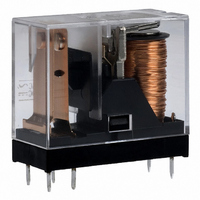G2R-1A-E-DC12 Omron, G2R-1A-E-DC12 Datasheet - Page 2

G2R-1A-E-DC12
Manufacturer Part Number
G2R-1A-E-DC12
Description
RELAY PWR SPST-NO 16A 12VDC
Manufacturer
Omron
Series
G2Rr
Datasheets
1.G2R-1A-E-DC12.pdf
(14 pages)
2.G2R-1A-E-DC12.pdf
(30 pages)
3.G2R-2-SND_DC24S.pdf
(19 pages)
Specifications of G2R-1A-E-DC12
Relay Type
General Purpose
Coil Resistance
275 Ohms
Contact Form
SPST-NO (1 Form A)
Contact Rating (current)
16A
Switching Voltage
380VAC, 125VDC - Max
Coil Type
Standard
Coil Current
43.6mA
Coil Voltage
12VDC
Turn On Voltage (max)
8.4 VDC
Turn Off Voltage (min)
1.8 VDC
Mounting Type
Through Hole
Termination Style
PC Pin
Circuit
SPST-NO (1 Form A)
Contact Rating @ Voltage
16A @ 250VAC
Control On Voltage (max)
8.4 VDC
Control Off Voltage (min)
1.8 VDC
Contact Rating
16 A
Contact Termination
Solder Pin
Mounting Style
Through Hole
Power Consumption
530 mW
Contact Material
Silver Alloy
Coil Voltage Vdc Nom
12V
Contact Current Max
16A
Contact Voltage Ac Nom
250V
Contact Voltage Dc Nom
30V
Contact Configuration
SPST-NO
Lead Free Status / RoHS Status
Lead free / RoHS Compliant
Lead Free Status / RoHS Status
Lead free / RoHS Compliant, Lead free / RoHS Compliant
Other names
G2R-1A-E-DC12
G2R1AEDC12
Z2307
G2R1AEDC12
Z2307
Available stocks
Company
Part Number
Manufacturer
Quantity
Price
Company:
Part Number:
G2R-1A-E-DC12V
Manufacturer:
OMRON
Quantity:
12 000
Company:
Part Number:
G2R-1A-E-DC12V
Manufacturer:
OMRON
Quantity:
12 000
Construction
■ SEALING
Unsealed
Relays of this type are intended for manual soldering. No measures
are taken against penetration of flux and cleaning solvent into the
relay. This type of relay cannot be immersion-cleaned.
Semi-Sealed
Special design construction prevents flux from penetrating into the
relay housing, for example, due to capillary action up the terminals
when the relay is soldered onto a PCB. This type of relay also cannot
be immersion-cleaned.
2
Construction
Features
Automatic flux
application
Automatic soldering
Automatic cleaning
Manual soldering
Penetration of dust
Penetration of corrosive
gas
Construction
Features
Automatic flux
application
Automatic soldering
Automatic cleaning
Manual soldering
Penetration of dust
Penetration of corrosive
gas
Classification
Classification
Electromechanical Relays
Terminals are separated
from PCB surface when re-
lay is mounted.
Poor
Poor
Poor
Good
Fair
Poor
Terminals, base, and case are sealed.
Good
Good
Good
Good
Good
Fair
Terminals separated
from PCB
Press-fit terminals
Technical Information
Fully Sealed
Unsealed
Contacts are positioned
away from base.
Poor
Poor
Poor
Good
Resin seal
Contacts located at
upper part of relay case
Fully Sealed
Fully sealing prevents not only flux, but also cleaning solvent from
penetrating into the relay housing. Therefore, this type of relay can
be immersion-cleaned. Relays are each tested before being shipped.
The relay is immersed in fluorocarbon solution for 1 minute, at a tem-
perature of 70°C +5°C/-0°C, to see if gases escape from the relay.
The following figure illustrates the test conditions.
Terminals are pressed into
base.
Good
Good
Poor
Good
Fair
Poor
Terminal and base, as well as the base and casing, are
sealed.
Good
Good
Good
Good
Good
Fair
Terminals
separated
from PCB
Press-fit terminals
50 mm
Fluorocarbon
solution
Resin seal
Relay
Resin seal
Surface Mounting
Semi-Sealed
Terminals are inserted into
base 0.3 mm min. thick.
Good
Good
Poor
Good
Terminals
separated
from PCB
Ex.) 70 °C
Glue pad
Inserted terminals
0.3 mm
min. base
thickness














